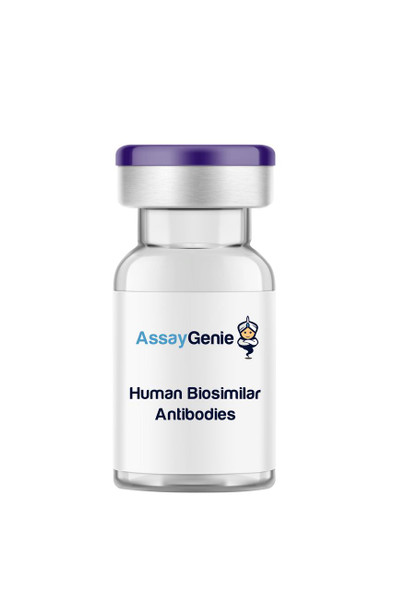Description
| Product Name: | Anti-Human CD279 (PD-1) (Nivolumab) - PE |
| SKU: | IVMB0436 |
| Size: | 50 µg |
| Antibody Type: | Biosimilar Recombinant Human Monoclonal Antibody |
| Clone: | 5C4.B8 |
| Target: | PD-1 |
| Isotype: | Human IgG1κ |
| Host Species: | Human |
| Reactivity: | Human/Cynomolgus Monkey |
| Applications: | FA |
| Expression Host: | HEK-293 Cells |
| FC Effector Activity: | Active |
| Synonyms: | PD1; PD-1; CD279; SLEB2; hPD-1; hPD-l; hSLE1 |
| Product Concentration: | 0.2 mg/ml |
| Excitation Laser: | Blue Laser (488 nm) and/or Green Laser (532 nm)/Yellow-Green Laser (561 nm) |
| Immunogen: | Human PD-1 |
| Applications and Recommended Usage: | FC The suggested concentration for Nivolumab biosimilar antibody for staining cells in flow cytometry is ≤ 1.0 μg per 106 cells in a volume of 100 μl. Titration of the reagent is recommended for optimal performance for each application. |
| Antigen Distribution: | PD-1 is expressed on a subset of CD4-CD8- thymocytes, and on activated T and B cells. |
| Formulation: | This R-phycoerythrin (R-PE) conjugate is formulated in 0.01 M phosphate buffered saline (150 mM NaCl) PBS pH 7.4, 1% BSA and 0.09% sodium azide as a preservative. |
| Specificity: | This non-therapeutic biosimilar antibody uses the same variable region sequence as the therapeutic antibody Nivolumab. Clone 5C4.B8 binds to the extracellular portion of Human/Cynomolgus PD-1 and does not bind to other IgG superfamily proteins. This product is for research use only. |
| Additional Applications Reported In Literature: | IHCFA |
| Additional Reported Applications For Relevant Conjugates: | B |
Programmed cell death protein 1 (PD-1) is a protein on the surface of cells that plays a role in the maintenance of self-tolerance. PD-1 promotes self-tolerance via the down-regulation of the immune system which results in the suppression of T cell inflammatory activity. PD-L1 and PD-L2 are the two ligands known to bind PD-1. PD-L1 has increased expression in several cancers.1 PD-L2 has a more limited expression and is primarily expressed by dendritic cells and only some tumor lines. Inhibition of the interaction of PD-1 with its ligands can function as an immune checkpoint blockade through the improvement of In vitro T-cell responses and via the mediation of anti-tumor activity.2 Nivolumab disrupts the negative signal that is responsible for T-cell activation and proliferation by binding to PD-1 on activated immune cells to selectively block the interaction of the PD-1 receptor with its ligands.3 Emerging research suggests that combined blockade of PD-1 and CTLA-4, with nivolumab and ipilimumab respectively, could produce greater antitumor activity than blockade of either pathway alone.4 This cost-effective, research-grade Anti-Human CD279 (PD-1) (Nivolumab) utilizes the same variable regions from the therapeutic antibody Nivolumab making it ideal for research projects.
| Ligand/Receptor: | PD-L1 and PD-L2 |
| Regulatory Status: | Research Use Only (RUO). Non-Therapeutic. |
| Storage and Handling: | This R-phycoerythrin (R-PE) conjugate is stable when stored at 2-8°C.Do not freeze. |
| Research Area: | Biosimilars |





![PE Anti-Human CD279/PD-1 Antibody [EH12.2H7] (AGEL2723) PE Anti-Human CD279/PD-1 Antibody [EH12.2H7] (AGEL2723)](https://cdn11.bigcommerce.com/s-h68l9z2lnx/images/stencil/590x590/products/229873/599065/pe-anti-human-cd279pd-1-antibody-eh12.2h7__58101.1703614571.jpg?c=2)
